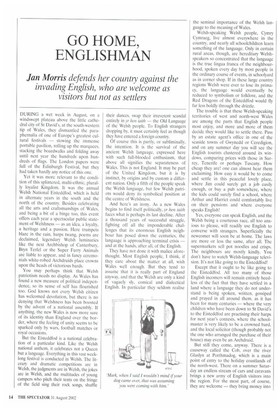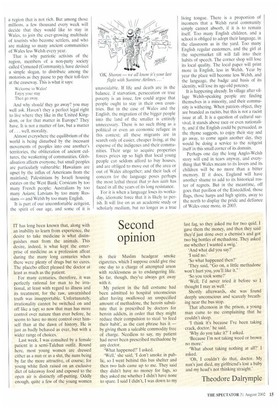GO HOME, ENGLISHMAN
Jan Morris defends her country against the
invading English, who are welcome as visitors but not as settlers
DURING a wet week in August, on a windswept plateau above the little cathedral city of St David's, at the south-western tip of Wales, they dismantled the paraphernalia of one of Europe's greatest cultural festivals — stowing the immense portable pavilion, rolling up the marquees, stacking the boardwalks and folding away until next year the hundreds upon hundreds of flags. The London papers were full of the Edinburgh Festival, but they had taken hardly any notice of this one.
Yet it was more relevant to the condition of this splintered, multi-ethnic, plurally loyalist Kingdom. It was the annual Welsh National Eisteddfod, which is held in alternate years in the south and the north of the country. Besides celebrating all the arts and craftsmanships of Wales, and being a bit of a binge too, this event offers each year a spectacular public statement of Welshness — as an idea, a loyalty, a heritage and a passion. Here trumpets blare in the rain, harps twang, poems are declaimed, legendary Welsh luminaries like the next Archbishop of Canterbury, Bryn Terfel or the Super Furry Animals are liable to appear, and in fancy ceremonials white-robed Archdruids place crowns upon the heads of victorious bards.
You may perhaps think that Welsh patriotism needs no display. As Wales has found a new measure of political independence, so its sense of self has flourished too. God knows not every Welsh citizen has welcomed devolution, but there is no denying that Welshness has been boosted by the advent of a national assembly. If anything, the new Wales is now more sure of its identity than England over the border, where the feeling of unity seems to be sparked only by wars, football matches or royal occasions.
But the Eisteddfod is a national celebration of a particular kind. Like the Welsh national anthem, it celebrates not a Queen but a language. Everything in this vast weeklong festival is conducted in Welsh. The literary and dramatic competitions are in Welsh, the judgments are in Welsh, the jokes are in Welsh, and the multitudes of young campers who pitch their tents on the fringe of the field sing their rock songs, shuffle their dances, swap their irreverent scandal entirely in yr hen iaith — the Old Language of the Welsh people. To English strangers dropping by, it must certainly feel as though they have entered a foreign country.
Of course this is partly, or subliminally, the intention. It is the survival of the ancient Welsh language, expressed here with such full-blooded enthusiasm, that above all signifies the separateness of Wales. This is not England. It may be part of the United Kingdom, but it is by instinct, by origins and by custom a different nation. Only a fifth of the people speak the Welsh language, but few Welsh patriots would deny its symbolical position at the centre of Welshness.
And here's an irony. As a new Wales begins to find itself politically, yr hen iaith faces what is perhaps its last decline. After a thousand years of successful struggle, fighting off all the imponderable challenges that its enormous English neighbour has posed down the centuries, the language is approaching terminal crisis — and at the hands, after all, of the English.
They have not done it with malice aforethought. Most English people, I think, if they care about the matter at all, wish Wales well enough. But they tend to assume that it is really part of England anyway, and that the Welsh are only a kind of vaguely sly, comical and dialectical English. In particular they seldom realise the seminal importance of the Welsh language to the meaning of Wales.
Welsh-speaking Welsh people, Cymry Cymraeg, live almost everywhere in the country, and nearly all schoolchildren learn something of the language. Only in certain rural areas, though, are hereditary Welshspeakers so concentrated that the language is the true lingua franca of the neighbourhood, spoken every day by most people in the ordinary course of events, in schoolyard as in corner shop. If in these large country regions Welsh were ever to lose its primacy, the language would eventually be reduced to symbolism or folklore, and the Red Dragons of the Eisteddfod would fly far less boldly through the drizzle.
The trouble is that these Welsh-speaking territories of west and north-west Wales are among the parts that English people most enjoy, and more and more of them decide they would like to settle there. Pass by an estate agent's office in one of the seaside towns of Gwynedd or Ceredigion, and on any summer day you will see the English tourists clustered around its windows, comparing prices with those in Surrey, Tenerife or perhaps Tuscany. How cheap they are! one can almost hear them exclaiming. How easy it would be to come and settle in this peaceful lovely place, where Jim could surely get a job easily enough, or buy a pub somewhere, where the kids could surely find a school, where Arthur and Harriet could comfortably live on their pensions and where everyone speaks English!
Yes, everyone can speak English, and the Welsh being a courteous race, all too anxious to please, will readily use English to converse with strangers. Superficially the newcomer will soon be at home. The laws are more or less the same, after all. The supermarkets sell pot noodles and crisps. The neighbours are mostly kindly. You don't have to watch Welsh-language television. It's not like going to the Eisteddfod!
Except that it ought to be like going to the Eisteddfod. All too many of those English incomers will remain entirely heedless of the fact that they have settled in a land where a language they do not understand is being spoken, written, gossiped and prayed in all around them, as it has been for many centuries — where the very children who have been down to St David's to the Eisteddfod are practising their harps for next year's contests, where the schoolmaster is very likely to be a crowned bard, and the local solicitor (though probably not the one who arranged the purchase of their house) may even be an Archdruid.
But still they come, anyway. There is a causeway called the Cob, over the river Glaslyn at Porthmadog, which is a main point of entry to the holiday coastlands of the north-west. There on a summer Saturday an endless stream of cars and caravans brings a new army of English visitors into the region. For the most part, of course, they are welcome — they bring money into a region that is not rich. But among those millions, a few thousand every week will decide that they would like to stay in Wales, to join the ever-growing multitude of tourists who become settlers, and who are making so many ancient communities of Wales less Welsh every year.
That is why patriotic activists of the region, members of a non-party society called Cymuned (Community), have devised a simple slogan, to distribute among the motorists as they pause to pay their toll-fees at the causeway. This is what it says:
Welcome to Wales! Enjoy your stay Then go away.
And why should they go away? you may well ask. Haven't they a perfect legal right to live where they like in the United Kingdom, or for that matter in Europe? They have. It is not a matter of law, but a matter of . . . well, morality.
Almost everywhere the equilibrium of the world is being disturbed by the incessant movements of peoples into one another's territories, the obliteration of ancient cultures, the weakening of communities. Globalisation affects everyone, but small peoples are particularly vulnerable: Hawaiians are upset by the influx of Americans from the mainland; Palestinians by Israeli housing estates on the West Bank; Corsicans by too many French people; Australians by too many Asians; Latvians by too many Russians — and Welsh by too many English.
It is part of our uncomfortable zeitgeist, the spirit of our age, and some of it is unavoidable. If life and death are in the balance, if starvation, persecution or true poverty is an issue, few could argue that people ought to stay in their own countries. But in the case of Wales and the English, the migration of the bigger people into the land of the smaller is entirely unnecessary. There is no such thing as a political or even an economic refugee in this context; all these migrants are in search only of easier, cheaper living, at the expense of the indigenes and their communities. Their urge to acquire properties forces prices up so high that local young people can seldom afford to buy houses, and are obliged to move out of the area or out of Wales altogether; and their lack of concern for the language poses perhaps the most lethal threat that yr hen iaith has faced in all the years of its long resistance.
For it is when a language loses its workaday, idiomatic force that it is likely to perish. It will live on as an academic study or scholarly medium, but no longer as a true living tongue. There is a proportion of incomers that a Welsh rural community simply cannot absorb, if it is to remain itself. Too many English children, and a school is obliged to adopt their language, in the classroom as in the yard. Too many English regular customers, and the girl at the supermarket till will fall into their habits of speech. The corner shop will lose its local quality. The local paper will print more in English, less in Welsh. Year by year the place will become less Welsh, and the language, the badge and basis of its identity, will lose its age-old potency.
It is happening already. In village after village Welsh-speaking people are finding themselves in a minority, and their community is withering. When patriots object, they are branded as racists, but this is not a racist issue at all. It is a question of cultural survival, it stands above race or even nationality, and if the English could be persuaded, as the rhyme suggests. to enjoy their stay and go away, to come again another day, they would be doing a service to the zeitgeist itself in this small corner of its domain.
Perhaps one day the long Anglo-Welsh story will end in tears anyway, and everything that Wales means to its lovers and its children will be no more than a bitter memory. If it does, England will have another shame to add to its historical roster of regrets. But in the meantime, off goes that pavilion of the Eisteddfod, those flags, those harps and high spirits, away to the north to display the pride and defiance of Wales once more, in 2003.



























































 Previous page
Previous page